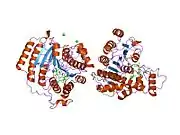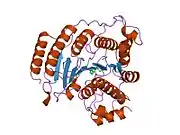HDAC8
Histone deacetylase 8 is an enzyme that in humans is encoded by the HDAC8 gene.[5][6][7]
Function
Histones play a critical role in transcriptional regulation, cell cycle progression, and developmental events. Histone acetylation / deacetylation alters chromosome structure and affects transcription factor access to DNA. The protein encoded by this gene belongs to class I of the histone deacetylase/acuc/apha family. It has histone deacetylase activity and represses transcription when tethered to a promoter.[7]
Histone deacetylase 8 is involved in skull morphogenesis[8] and metabolic control of the ERR-alpha / PGC1-alpha transcriptional complex.[9]
Clinical significance
HDAC8 has been linked to number of disease states notably to acute myeloid leukemia and is related to actin cytoskeleton in smooth muscle cells. siRNA targeting HDAC8 showed anticancer effects.[10] Inhibition of HDAC8 induced apoptosis has been observed in T cell lymphomas.[11] In addition the HDAC8 enzyme has been implicated in the pathogenesis of neuroblastoma.[12] Therefore, there has been interest in developing HDAC8 selective inhibitors.[13][14]
Interactions
- ERR-alpha.[9]
See also
References
- GRCh38: Ensembl release 89: ENSG00000147099 - Ensembl, May 2017
- GRCm38: Ensembl release 89: ENSMUSG00000067567 - Ensembl, May 2017
- "Human PubMed Reference:". National Center for Biotechnology Information, U.S. National Library of Medicine.
- "Mouse PubMed Reference:". National Center for Biotechnology Information, U.S. National Library of Medicine.
- McDonell N, Ramser J, Francis F, Vinet MC, Rider S, Sudbrak R, Riesselman L, Yaspo ML, Reinhardt R, Monaco AP, Ross F, Kahn A, Kearney L, Buckle V, Chelly J (May 2000). "Characterization of a highly complex region in Xq13 and mapping of three isodicentric breakpoints associated with preleukemia". Genomics. 64 (3): 221–9. doi:10.1006/geno.2000.6128. PMID 10756090.
- Van den Wyngaert I, de Vries W, Kremer A, Neefs J, Verhasselt P, Luyten WH, Kass SU (Aug 2000). "Cloning and characterization of human histone deacetylase 8". FEBS Lett. 478 (1–2): 77–83. doi:10.1016/S0014-5793(00)01813-5. PMID 10922473.
- "Entrez Gene: HDAC8 histone deacetylase 8".
- Haberland M, Mokalled MH, Montgomery RL, Olson EN (July 2009). "Epigenetic control of skull morphogenesis by histone deacetylase 8". Genes Dev. 23 (14): 1625–30. doi:10.1101/gad.1809209. PMC 2714711. PMID 19605684.
- Wilson BJ, Tremblay AM, Deblois G, Sylvain-Drolet G, Giguère V (July 2010). "An acetylation switch modulates the transcriptional activity of estrogen-related receptor alpha". Mol. Endocrinol. 24 (7): 1349–58. doi:10.1210/me.2009-0441. PMC 5417470. PMID 20484414.
- Gallinari P, Di Marco S, Jones P, Pallaoro M, Steinkühler C (March 2007). "HDACs, histone deacetylation and gene transcription: from molecular biology to cancer therapeutics". Cell Res. 17 (3): 195–211. doi:10.1038/sj.cr.7310149. PMID 17325692.
- Balasubramanian S, Ramos J, Luo W, Sirisawad M, Verner E, Buggy JJ (May 2008). "A novel histone deacetylase 8 (HDAC8)-specific inhibitor PCI-34051 induces apoptosis in T-cell lymphomas". Leukemia. 22 (5): 1026–34. doi:10.1038/leu.2008.9. PMID 18256683.
- Oehme I, Deubzer HE, Wegener D, Pickert D, Linke JP, Hero B, Kopp-Schneider A, Westermann F, Ulrich SM, von Deimling A, Fischer M, Witt O (January 2009). "Histone deacetylase 8 in neuroblastoma tumorigenesis". Clin. Cancer Res. 15 (1): 91–9. doi:10.1158/1078-0432.CCR-08-0684. PMID 19118036.
- Patil V, Sodji QH, Kornacki JR, Mrksich M, Oyelere AK (May 2013). "3-Hydroxypyridin-2-thione as novel zinc binding group for selective histone deacetylase inhibition". Journal of Medicinal Chemistry. 56 (9): 3492–506. doi:10.1021/jm301769u. PMC 3657749. PMID 23547652.
- Suzuki T, Ota Y, Ri M, Bando M, Gotoh A, Itoh Y, Tsumoto H, Tatum PR, Mizukami T, Nakagawa H, Iida S, Ueda R, Shirahige K, Miyata N (November 2012). "Rapid discovery of highly potent and selective inhibitors of histone deacetylase 8 using click chemistry to generate candidate libraries". Journal of Medicinal Chemistry. 55 (22): 9562–75. doi:10.1021/jm300837y. PMID 23116147.
Further reading
- Waltregny D, De Leval L, Glénisson W, Ly Tran S, North BJ, Bellahcène A, Weidle U, Verdin E, Castronovo V (2004). "Expression of histone deacetylase 8, a class I histone deacetylase, is restricted to cells showing smooth muscle differentiation in normal human tissues". Am J Pathol. 165 (2): 553–64. doi:10.1016/S0002-9440(10)63320-2. PMC 1618574. PMID 15277229.
- Glénisson W, Waltregny D, Tran SL, North BJ, Verdin E, Colige A, Castronovo V (June 2005). "Histone deacetylase HDAC8 associates with smooth muscle alpha-actin and is essential for smooth muscle cell contractility". FASEB J. 19 (8): 966–8. doi:10.1096/fj.04-2303fje. PMID 15772115.
- Wedel T, Van Eys GJ, Waltregny D, Glénisson W, Castronovo V, Vanderwinden JM (2006). "Novel smooth muscle markers reveal abnormalities of the intestinal musculature in severe colorectal motility disorders". Neurogastroenterol. Motil. 18 (7): 526–38. doi:10.1111/j.1365-2982.2006.00781.x. PMID 16771768.
- Verdin E, Dequiedt F, Kasler HG (2003). "Class II histone deacetylases: versatile regulators". Trends Genet. 19 (5): 286–93. CiteSeerX 10.1.1.464.415. doi:10.1016/S0168-9525(03)00073-8. PMID 12711221.
- Hu E, Chen Z, Fredrickson T, et al. (2000). "Cloning and characterization of a novel human class I histone deacetylase that functions as a transcription repressor". J. Biol. Chem. 275 (20): 15254–64. doi:10.1074/jbc.M908988199. PMID 10748112.
- Buggy JJ, Sideris ML, Mak P, et al. (2001). "Cloning and characterization of a novel human histone deacetylase, HDAC8". Biochem. J. 350 (1): 199–205. doi:10.1042/0264-6021:3500199. PMC 1221242. PMID 10926844.
- Amann JM, Nip J, Strom DK, et al. (2001). "ETO, a target of t(8;21) in acute leukemia, makes distinct contacts with multiple histone deacetylases and binds mSin3A through its oligomerization domain". Mol. Cell. Biol. 21 (19): 6470–83. doi:10.1128/MCB.21.19.6470-6483.2001. PMC 99794. PMID 11533236.
- Strausberg RL, Feingold EA, Grouse LH, et al. (2003). "Generation and initial analysis of more than 15,000 full-length human and mouse cDNA sequences". Proc. Natl. Acad. Sci. U.S.A. 99 (26): 16899–903. doi:10.1073/pnas.242603899. PMC 139241. PMID 12477932.
- Durst KL, Lutterbach B, Kummalue T, et al. (2003). "The inv(16) fusion protein associates with corepressors via a smooth muscle myosin heavy-chain domain". Mol. Cell. Biol. 23 (2): 607–19. doi:10.1128/MCB.23.2.607-619.2003. PMC 151524. PMID 12509458.
- Rodriguez M, Yu X, Chen J, Songyang Z (2004). "Phosphopeptide binding specificities of BRCA1 COOH-terminal (BRCT) domains". J. Biol. Chem. 278 (52): 52914–8. doi:10.1074/jbc.C300407200. PMID 14578343.
- Johnson JM, Castle J, Garrett-Engele P, et al. (2004). "Genome-wide survey of human alternative pre-mRNA splicing with exon junction microarrays". Science. 302 (5653): 2141–4. CiteSeerX 10.1.1.1017.9438. doi:10.1126/science.1090100. PMID 14684825.
- Lee H, Rezai-Zadeh N, Seto E (2004). "Negative regulation of histone deacetylase 8 activity by cyclic AMP-dependent protein kinase A". Mol. Cell. Biol. 24 (2): 765–73. doi:10.1128/MCB.24.2.765-773.2004. PMC 343812. PMID 14701748.
- Vannini A, Volpari C, Filocamo G, et al. (2004). "Crystal structure of a eukaryotic zinc-dependent histone deacetylase, human HDAC8, complexed with a hydroxamic acid inhibitor". Proc. Natl. Acad. Sci. U.S.A. 101 (42): 15064–9. doi:10.1073/pnas.0404603101. PMC 524051. PMID 15477595.
- Waltregny D, North B, Van Mellaert F, et al. (2005). "Screening of histone deacetylases (HDAC) expression in human prostate cancer reveals distinct class I HDAC profiles between epithelial and stromal cells". European Journal of Histochemistry. 48 (3): 273–90. PMID 15590418.
- Waltregny D, Glénisson W, Tran SL, et al. (2006). "Histone deacetylase HDAC8 associates with smooth muscle alpha-actin and is essential for smooth muscle cell contractility". FASEB J. 19 (8): 966–8. doi:10.1096/fj.04-2303fje. PMID 15772115.
- Gantt SL, Gattis SG, Fierke CA (2006). "Catalytic activity and inhibition of human histone deacetylase 8 is dependent on the identity of the active site metal ion". Biochemistry. 45 (19): 6170–8. doi:10.1021/bi060212u. PMID 16681389.
- Lee H, Sengupta N, Villagra A, et al. (2006). "Histone deacetylase 8 safeguards the human ever-shorter telomeres 1B (hEST1B) protein from ubiquitin-mediated degradation". Mol. Cell. Biol. 26 (14): 5259–69. doi:10.1128/MCB.01971-05. PMC 1592721. PMID 16809764.
- Vannini A, Volpari C, Gallinari P, et al. (2007). "Substrate binding to histone deacetylases as shown by the crystal structure of the HDAC8-substrate complex". EMBO Reports. 8 (9): 879–84. doi:10.1038/sj.embor.7401047. PMC 1973954. PMID 17721440.
- Nakagawa M, Oda Y, Eguchi T, et al. (2007). "Expression profile of class I histone deacetylases in human cancer tissues". Oncol. Rep. 18 (4): 769–74. doi:10.3892/or.18.4.769. PMID 17786334.
External links
- HDAC8+protein,+human at the US National Library of Medicine Medical Subject Headings (MeSH)
This article incorporates text from the United States National Library of Medicine, which is in the public domain.









